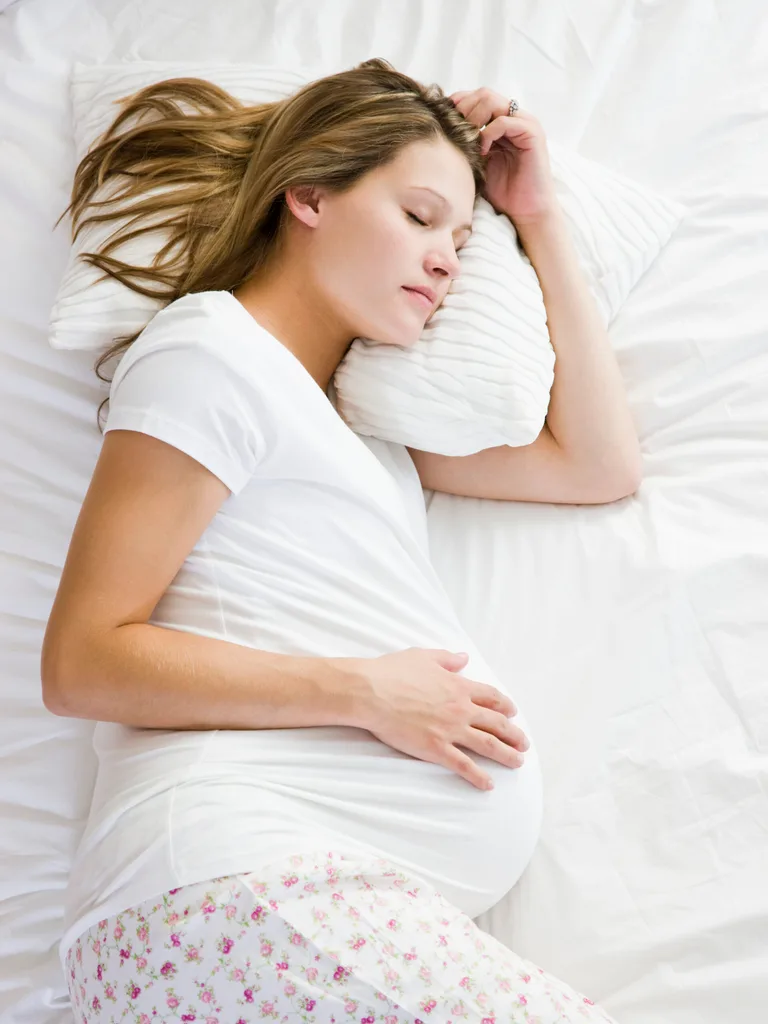We’re all familiar with the bleary-eyed feeling that follows a bad night’s sleep. Unfortunately, pregnant women are even more likely to suffer from sleep problems, which can take its toll.
According to midwife Bounty expert Megan Baker, consistently missing out on sleep can lower your immune system and make pregnancy feel like harder work. But try not to worry too much about it. Having said that, sleeping problems are so common, especially among pregnant women, that doctors consider it normal.
Getting plenty of rest during the day helps and, once you work out why your shut-eye is being disrupted, it’s easier to remedy. Here are 7 ways to improve your sleep.
1. No sips after 7pm
Stick to this curfew for main fluids, and only have small drinks after this time. But don’t avoid fluids altogether or you’ll be at risk of dehydration.
Why it works: “The more liquid in your system, the more night-time toilet trips,” says Megan. “After your last wee before going to bed, walk around the bathroom, then sit down and try to go to the toilet again.” An empty bladder means fewer bathroom trips in the small hours.
Best for: The first and third trimesters of pregnancy, when nocturnal trips to the toilet are a major disturbance.
2. Boost gravity
Use an extra pillow, so your head is raised higher than your feet.
Why it works: Higher levels of progesterone in pregnancy relax the valve at the top of the stomach. This can lead to the acid burn of indigestion, which can be worse if your bump is large, you’re having twins or bub is in a breech position. “Propping yourself up puts gravity on your side, helping to ease this,” says Megan.
Best for: The first and third trimesters of pregnancy, when the incidence of heartburn is more prevalent.
3. Hug a pillow
Lie on your side with a pillow positioned between your knees.
Why it works: It reduces pressure around the pelvic area, which helps to soothe sleep-disrupting aches.
Best for: The third trimester. It’s also invaluable if you suffer from symphysis pubis dysfunction (SPD), where the hip and pelvic area become inflamed and painful.
4. Ditch the doona
Swap your usual choice of bedding for cotton sheets and a light blanket. Try to keep the bedroom at 15°C or below, too.
Why it works: You can only go into the deep phase of sleep and produce melatonin when your body temperature drops. But increased blood volume and hormonal changes mean women can feel warmer during pregnancy.
Best for: Women who wake up all hot and bothered. “Place the quilt under your bottom sheet as a mattress topper,” says Megan. “It takes pressure off aching joints.”

Lie on your side with a pillow positioned between your knees to reduce pressure in the pelvic area.
(Getty Images)5. Eat a snack
Before turning in for the night, eat half a banana drizzled with honey and drink a small glass of milk.
Why it works: Bananas and milk are good sources of tryptophan, which produces the sleep hormone melatonin. Honey also contains sedative properties, so consuming these foods before bedtime will encourage you to nod off.
Best for: Sufferers of cramp. Having a deficiency in magnesium can make you more likely to experience cramps, and bananas are rich in this mineral.
6. Take power naps
Snooze after lunch, the time when you experience a natural lull in your day.
Why it works: A nap recharges your energy levels, but don’t make it any longer than 20 minutes or you may have trouble getting to sleep in the evening.
Best for: Building up energy levels during the last trimester. This will also get you used to napping while bub naps in the first few weeks after you give birth.
7. Show your stripes
Wear adhesive strips over your nose to open up nostrils and increase oxygen flow.
Why it works: The increase in blood volume when you’re pregnant causes your nasal passages to swell, reducing airflow and oxygen in the body.
Best for: Snorers. Many pregnant women start snoring, which can lead to sleep apnoea. This is when your breathing stops for a few seconds at a time while you’re asleep, which can increase the risk of high blood pressure and pre-eclampsia. See your GP if you think you have this.


